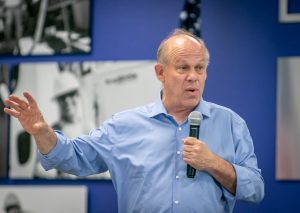IBEW Local 1245 is facing enormous challenges on multiple fronts, Business Manager Tom Dalzell told the Advisory Council during its quarterly meeting in late April. According to Dalzell, there are four key areas where the union is fighting diligently to protect and defend Local 1245 members – in the tree trimming industry, in the public sector, in Nevada and at PG&E.
Dalzell began by explaining the issue of equitable pay for Local 1245’s hard-working and skilled tree trimming members, whose wages are being dragged down because of a multi-faceted “trickle down” dynamic that involves the California Public Utilities Commission (PUC), PG&E and the tree trimming companies.
“The ratepayer advocates are always urging the PUC to lower costs, opposing more money for vegetation management. With each General Rate Case, the PUC grants PG&E a limited amount of funding for tree trimming, which is the root cause of the low compensation rates for the tree contractors, and in turn, the low pay for tree trimmers,” explained Dalzell. “But during the next PUC General Rate Case, we are going to make a major assault on this dynamic. With last year’s wildfires, the importance of vegetation management cannot be ignored. This is an issue that cries out for strong attention, and we will give it the attention it deserves during the GRC.”
Dalzell also discussed the nationwide attack on public sector union members, which will soon come to a head when the U.S. Supreme Court issues a decision in the highly publicized Janus v. AFSCME case, which will likely lead to “Right to Work” style workplaces for civil servants in all 50 states. Although the backers of Janus brought their case to weaken and divide unions, Local 1245’s public sector members have embraced the challenge as an opportunity to strengthen and unify the union, stepping up to the task of signing up their co-workers to remain voluntary dues-paying union members, regardless as to the Janus decision.
“These Volunteer Organizing Committee members are doing absolutely tremendous work. I want to thank you for all that you do,” Dalzell said as he recognized all of the public sector VOC members in attendance at the Advisory Council meeting. “The program that we’ve created here has become a model for the AFL-CIO, labor councils, other unions and the state federation of labor, and the IBEW 9th district is also using our materials. That’s a source of pride for us, but the greatest pride is what our members have done by organizing at their own worksites.”
The third front of the union’s war, according to Dalzell, is happening in Nevada, where voters will once again be presented with a constitutional amendment to deregulate the state’s utility sector. In the two years since the ballot question was first approved by Nevada voters, Local 1245 has been building a strong, bi-partisan coalition of leaders, businesses and lawmakers from both sides of the aisle, putting the union in a much stronger position to defeat this dangerous ballot measure this year.
“Historically, 1245 judged politicians by one criteria — how they are on labor issues. But what’s happened in Nevada has changed our approach, and now, we ask lawmakers what their position is on OUR issues – energy and utilities issues. And that’s a very different question,” said Dalzell. “Over the last few years, we have made real inroads, building relationships with more Main Street Republican politicians and candidates. We have not abandoned our relationships with Democrats, but there’s a group of Congress members in Washington that call themselves ‘No Labels,’ and I think that’s our approach right now. No labels. It makes us stronger, and sends a message to the Democrats that they cannot take us for granted.”
Finally, Dalzell outlined the threats to PG&E’s survival, given the strict liability standard that the company is being held to following last year’s wildfires. The company may still be on the hook for tens of billions of dollars in damages, despite no evidence from CalFire or other parties that indicate the company acted in a negligent fashion.
“Previously, we’d been worried about what’s happening with CCAs. We were worried about net energy metering, we worried about solar customers being subsidized by non-solar. Now, all of that looks like chump change compared to this wildfire issue,” said Dalzell. “But we are working on legislative fixes to it. We have started with the Dodd bill [SB 1088], which will force the company to spend money doing things they should be doing. And as a side effect, our one little local is now perceived as the most powerful political union in California, thank to what our Organizing Stewards have been doing. They’ve given us strength that we didn’t have five years ago, a big presence in the political world, and respect from both Democrats and Republicans alike.”
–Rebecca Band, IBEW 1245 Communications Director
